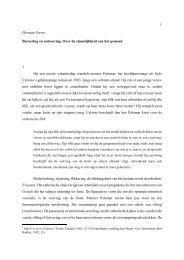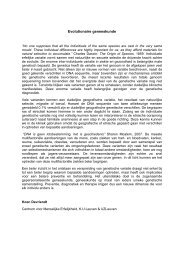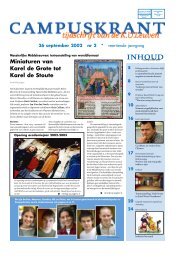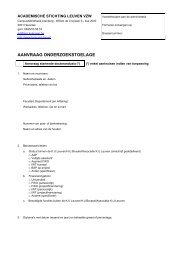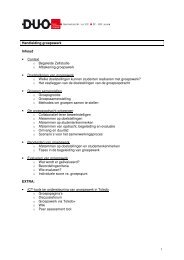EQUALITY GUIdE - KU Leuven
EQUALITY GUIdE - KU Leuven
EQUALITY GUIdE - KU Leuven
Create successful ePaper yourself
Turn your PDF publications into a flip-book with our unique Google optimized e-Paper software.
Chapter 4 ! Scientific communication 205<br />
4.1.1.6. The glass ceiling at the university<br />
See general introduction for more information about the glass ceiling at universities.<br />
4.1.1.7. Differences between women and men<br />
Another question is whether men are different. A recent research by a female journalist<br />
who infiltrated as a man in men’s clubs, shows the following differences: among men<br />
exists a kind of ‘brotherhood’ and contacts between men seem to be easier than between<br />
men and women. This is largely due to sex differences, to the different worlds.<br />
Men have more authority and self-confidence and pay more attention to their careers<br />
on the long term.<br />
4.1.1.8. Gender and communication?<br />
The combination of gender and communication is not an obvious one. The participants<br />
in the test training were asked what they think about it.<br />
According to the participants, we need to distinguish two levels of communication: 1)<br />
career communication and 2) social talk. The questions they asked themselves were<br />
when to use which words? What to say in which situation? What is the correct strategy?<br />
Can you talk about your family? How to communicate in a concise and efficient way?<br />
Are there any rules with respect to communication? What does a targeted communication<br />
imply and how do you use communication in a strategic way? What do you say to<br />
whom? How can you make sure people (e.g. your promoter) listen to you? Perhaps,<br />
too much communication is not the way to go either? In short, the participants hoped<br />
to discover the do’s and don’ts of communication strategies in the training.<br />
A second subject handles about the aim of networking and how to network as strategically<br />
as possible? How can you use communication to increase your visibility and to<br />
create more chances? How can you find good and reliable mentors/counsellors?<br />
The third point they discussed was the relationship with male superiors. Male professors,<br />
who are higher in rank, can use their power. How do you handle delicate situations?<br />
How do you avoid trouble while saying what you have to say? How can you use<br />
arguments that do not fit their framework? How can you refuse tasks and assignments<br />
(e.g. education tasks, caring tasks) in a tolerable way? How can your communication<br />
style help you to avoid people taking advantage of you?<br />
Daring to talk about your career without seeming too ambitious and without influencing<br />
the process is a fourth point of interest. The participants wanted to get tips about<br />
how to express their expectations. How can you communicate about your ambitions<br />
without being seen as a ‘bee queen’ (or becoming one)?<br />
How do you communicate (emotions) to the people who stipulate your career? What<br />
has to be emphasized on your CV, which details do you need to include (or not)? In



